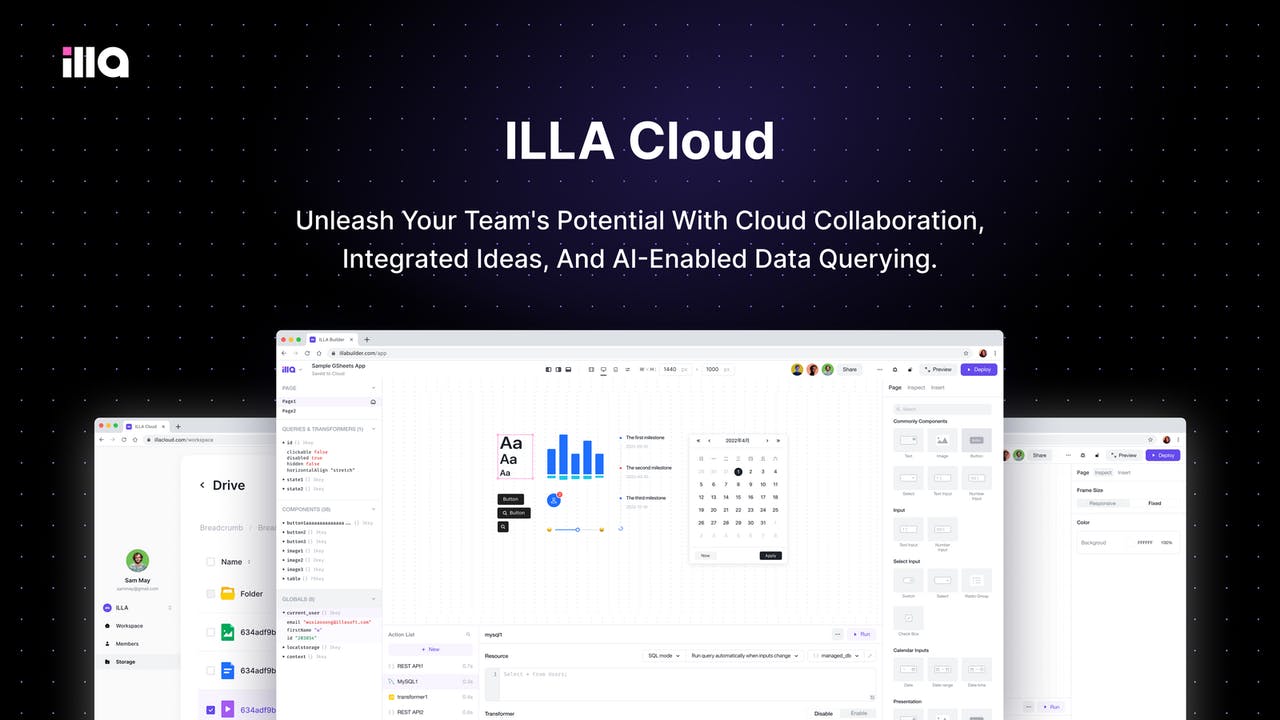In the fast-paced world of logistics, efficient and streamlined operations are crucial for businesses to thrive. To meet the unique needs of the industry, ILLA Cloud offers a revolutionary low-code platform that enables the development of white-label logistics software. In this comprehensive guide, we will explore how ILLA Cloud empowers businesses to build customized logistics software tailored to their specific requirements. From logistic billing to supply chain management, ILLA Cloud provides the tools and features necessary for seamless logistics operations.
Understanding the Power of Logistics Software
In today's fast-paced business world, logistics software has emerged as a game-changer for efficient supply chain management. Logistic billing software, white-label logistics software, and custom software development for logistics have become crucial tools for businesses seeking to optimize their operations and gain a competitive edge. By leveraging the power of logistics software, companies can streamline their processes, improve accuracy, and enhance overall efficiency. From tracking shipments to managing inventory and ensuring timely deliveries, logistics software offers a comprehensive solution to the complex challenges faced by modern businesses.
One of the key advantages of logistics software is its ability to provide real-time visibility into the entire supply chain. With retail logistics software, businesses can effectively manage inventory levels, monitor product availability, and track shipments from suppliers to customers. This ensures that businesses can meet customer demands promptly while minimizing stockouts and overstock situations. Similarly, construction logistics software caters to the unique needs of the construction industry by optimizing project timelines, managing material flows, and coordinating resources efficiently. By adopting specialized logistics software solutions, businesses can ensure seamless coordination between various stakeholders and enhance project execution.
White-label logistics software brings additional benefits to businesses. It allows companies to customize the software according to their specific requirements, branding it as their solution. This level of customization enables businesses to align the software with their existing processes, integrate it with other systems, and create a seamless user experience. Additionally, SaaS-based and cloud-based logistics software offer flexibility, scalability, and accessibility, empowering businesses to adapt to changing market demands and scale their operations efficiently. These solutions eliminate the need for complex infrastructure and extensive IT resources, making logistics software accessible to businesses of all sizes.
When selecting a logistics software solution, businesses should consider factors such as scalability, integration capabilities, user-friendliness, and support services. Open-source logistics software provides the advantage of customization and community support, allowing businesses to tailor the software to their specific needs. On the other hand, commercial logistics software offers comprehensive features, dedicated support, and ongoing updates. For small-scale operations, free logistics software can be a viable option, providing basic functionalities and cost-saving benefits. Ultimately, businesses must assess their requirements and choose a logistics software solution that aligns with their goals and budget.
Successful implementation of logistics software is evident in numerous case studies and success stories. Businesses across various industries have witnessed significant improvements in efficiency, cost savings, and customer satisfaction. From e-commerce giants streamlining their fulfillment processes to manufacturing companies optimizing their inventory management, logistics software has revolutionized the way businesses operate. By embracing logistics software, businesses can overcome operational challenges, gain valuable insights from data analytics, and make data-driven decisions that drive growth and success.
The Future of Logistics Software Development
The logistics industry is undergoing a significant transformation driven by advancements in technology and changing customer expectations. As businesses strive to optimize their supply chain operations, logistics software development plays a crucial role in streamlining processes, enhancing visibility, and improving overall efficiency. With the rise of white-label logistics software, companies can now leverage ready-to-use solutions that are customizable to their specific needs. This approach offers several advantages, such as cost-effectiveness, faster implementation, and scalability, making it an attractive option for businesses of all sizes.
One of the key benefits of logistics software is its ability to centralize and automate various aspects of the supply chain. By integrating different functions, such as order management, inventory control, and transportation tracking, logistics software enables businesses to streamline operations and reduce manual errors. Real-time visibility into inventory levels, delivery status, and performance metrics empowers businesses to make informed decisions and respond swiftly to changing market demands. Additionally, logistics software provides robust reporting and analytics capabilities, allowing organizations to gain valuable insights, identify bottlenecks, and optimize their processes for improved efficiency.
Custom software development for logistics takes the benefits of off-the-shelf solutions a step further by tailoring the software to meet the unique requirements of the business. Whether it's retail logistics software designed to handle complex omnichannel operations or construction logistics software that focuses on managing heavy equipment and materials, custom solutions offer the flexibility and functionality needed to address specific industry challenges. By partnering with experienced software developers, businesses can create logistics software that aligns with their workflows, integrates seamlessly with existing systems, and provides a competitive edge in the market.
The emergence of Software as a Service (SaaS) and cloud-based logistics software has revolutionized the industry. These solutions eliminate the need for businesses to invest in costly infrastructure and maintenance, as the software is hosted and managed by the service provider. Cloud-based logistics software offers scalability, accessibility, and real-time collaboration, allowing teams to work efficiently across different locations and devices. Additionally, logistics CRM software enhances customer relationship management by consolidating customer data, facilitating communication, and providing personalized experiences, ultimately leading to improved customer satisfaction and retention.
In recent years, there has been a surge in open-source and free logistics software, offering businesses more options and flexibility in choosing the right solution. Open-source logistics software provides access to the source code, allowing businesses to customize and extend the software according to their specific needs. This enables organizations to take advantage of the vibrant developer community, contribute to the software's development, and benefit from continuous improvements. Free logistics software, although limited in functionality, can be a good starting point for small businesses or those with simpler requirements, offering basic features and an opportunity to evaluate the software before investing in a more comprehensive solution.
As logistics software development continues to evolve, businesses need to stay informed about the latest trends and innovations shaping the industry. The integration of artificial intelligence and machine learning is poised to revolutionize logistics operations by enabling predictive analytics, automated decision-making, and optimization algorithms. From intelligent route planning to demand forecasting and risk management, the power of these technologies can unlock new levels of efficiency and cost savings in the logistics sector. By embracing these advancements and leveraging the advantages and benefits of logistics software, businesses can stay competitive in a rapidly changing market and drive their success in the future.
Introduction to ILLA Cloud: A Low-Code Platform for Custom Logistics Software

In the rapidly evolving world of logistics, businesses are increasingly turning to innovative solutions to meet the challenges of the industry. This is where ILLA Cloud, a powerful low-code development platform, comes into play. With its robust features and capabilities, ILLA Cloud offers a comprehensive solution for building custom logistics software. Leveraging the power of low code react development, ILLA Cloud enables businesses to create sophisticated applications with ease, revolutionizing the way logistics operations are managed.
One of the key advantages of using ILLA Cloud for logistic billing software is its white-label capability. White-label logistics software allows you to remove any branding associated with the platform itself and replace it with your own branding elements. This gives your software a professional and cohesive look, making it appear as a proprietary solution developed exclusively for your business. By incorporating your company's logo, color scheme, and visual elements, you can create a software interface that aligns perfectly with your brand identity.
When comparing low-code vs pro-code approaches, ILLA Cloud shines as a frontrunner in the low-code development space. While traditional coding methods require intricate programming skills and a significant investment of time and resources, ILLA Cloud's low-code environment simplifies the entire development process. With its low code react builder, developers can leverage pre-built components and templates, accelerating the development cycle and reducing the chances of errors. This enables businesses to quickly respond to market demands, implement changes, and deliver custom logistics software solutions in a fraction of the time it would take using traditional coding methods.
ILLA Cloud's low-code approach to logistics software development enables you to create a SaaS (Software as a Service) or cloud-based logistics software solution. This means your software can be accessed from anywhere with an internet connection, allowing your team to collaborate remotely and ensuring real-time data synchronization. Additionally, ILLA Cloud provides options for integrating logistics CRM (Customer Relationship Management) functionality into your software, empowering you to manage customer interactions, track leads, and enhance customer satisfaction.
With ILLA Cloud, you have the freedom to choose whether to build your logistics software from scratch or leverage open-source logistics software components. This flexibility allows you to save development time and effort by utilizing pre-built modules, frameworks, and libraries while customizing them to suit your specific needs. Furthermore, ILLA Cloud offers free logistics software templates and resources, enabling you to kick-start your development process and accelerate time-to-market.
ILLA Cloud's low-code capabilities extend beyond development efficiency. The platform also offers a vibrant community of like-minded individuals and businesses in the no code community. This community fosters collaboration, knowledge sharing, and support, allowing users to tap into a wealth of resources and gain insights from experienced practitioners. Moreover, ILLA Cloud integrates seamlessly with popular tech stacks for startups, enabling businesses to leverage their existing infrastructure and maximize the benefits of their technology investments. Whether it's integrating with databases, APIs, or other external systems, ILLA Cloud offers the flexibility and compatibility required for successful logistics software development.
While ILLA Cloud stands out as an exceptional low-code platform, it's important to explore alternatives such as Retool to make an informed decision. However, with its comprehensive feature set, including best drag-and-drop app builder free options, ILLA Cloud offers a competitive advantage. Its focus on custom web application development, specifically tailored for the logistics industry, makes it a valuable tool for businesses looking to streamline their operations, enhance visibility, and gain a competitive edge. By leveraging ILLA Cloud, businesses can unlock the potential of low-code development and build powerful logistics software that meets their unique needs.
Conclusion
In conclusion, ILLA Cloud is revolutionizing the logistics industry with its low-code platform for building white-label logistics software. By leveraging the extensive features and capabilities of ILLA Cloud, businesses can create custom logistics solutions that streamline operations, enhance efficiency, and drive growth. From logistic billing software to supply chain management and beyond, ILLA Cloud provides the tools necessary to build robust and scalable logistics software. Stay ahead of the competition and unlock the full potential of your logistics operations with ILLA Cloud.
Note: This blog is a guide and reference for building white-label logistics software. For detailed technical instructions and support, please refer to the official documentation and resources provided by ILLA Cloud.
Join our Discord Community: discord.com/invite/illacloud
Source:
(1) ILLA Cloud x Hugging Face: use AI Model with Low-Code. https://blog.illacloud.com/illa-cloud-x-hugging-face-unleash-the-possibility-of-ai-model-with-low-code-tool/.
(2) About ILLA - ILLA. https://www.illacloud.com/en-US/docs/about-illa.
(3) ILLA Cloud | Accelerate your internal tools development. https://www.illacloud.com/.
(4) ILLA Cloud - Product Information, Latest Updates, and Reviews 2023 .... https://www.producthunt.com/products/illa.
(5) How to Automate Tasks with ILLA Cloud. https://blog.illacloud.com/how-to-automate-tasks-with-illa-cloud-a-low-code-platform-for-internal-tools/.
(6) About ILLA - ILLA. https://www.illacloud.com/docs/about-illa.

